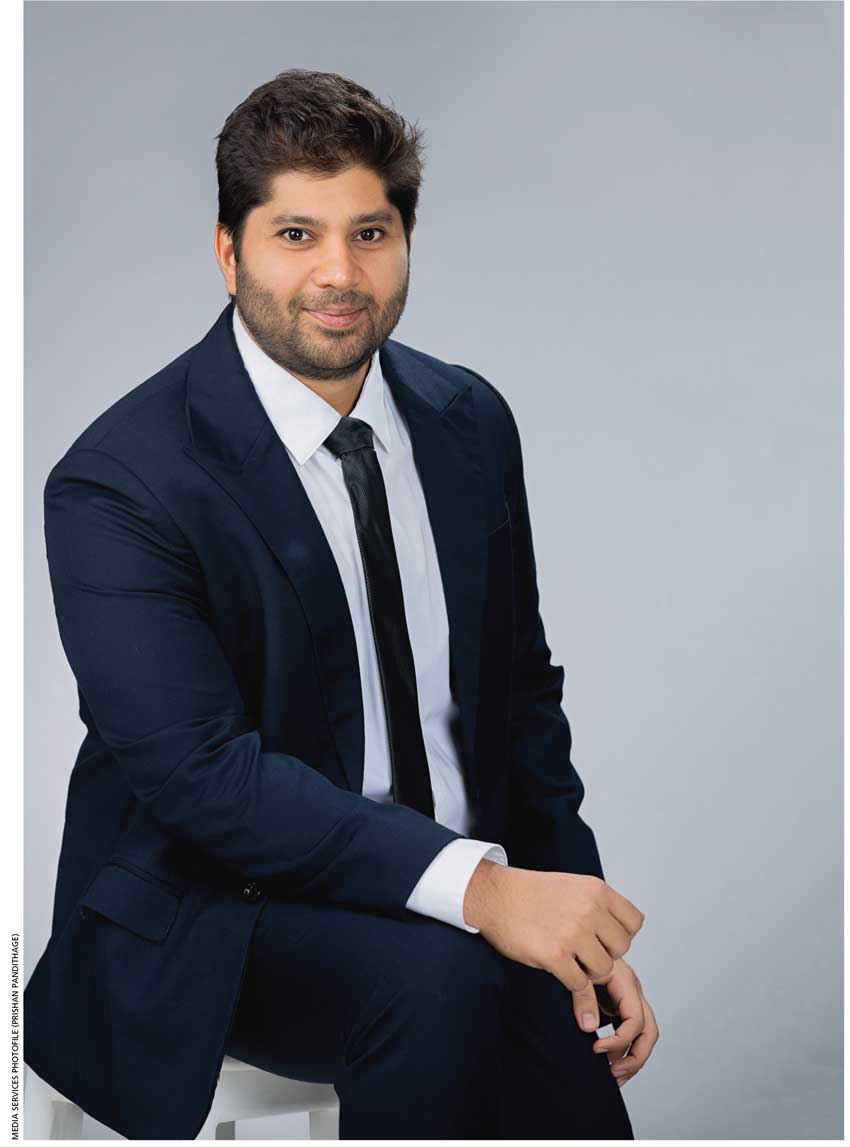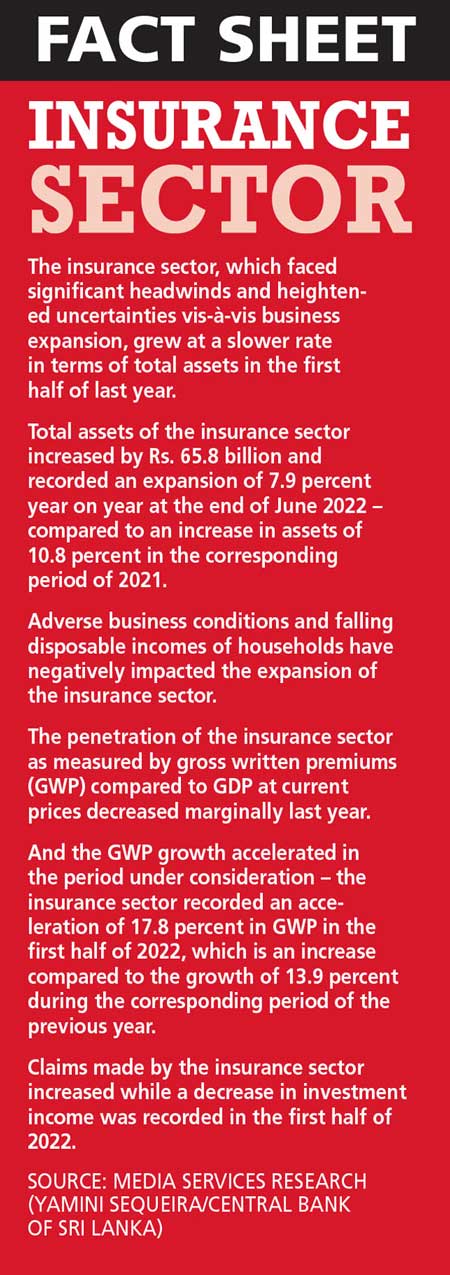INSURANCE SECTOR
Compiled by Yamini Sequeira
THINKING OUT OF THE BOX
Hassan Kassim believes the time is right for innovative insurance solutions

The insurance sector has faced daunting challenges beginning with the COVID-19 pandemic and the economic crisis that followed. In terms of overall revenue or gross written premiums (GWP), the first half of 2022 was favourable for both motor and non-motor business, medical, fire, engineering and so on.
And due to the depreciation of the rupee, the sums insured increased – therefore, higher premiums were earned by insurance businesses.
In sharp contrast, the second half of the year saw interest rates rising dramatically as the government stepped in to control inflationary pressure, which in turn led to a slowdown. As interest rates rose, people couldn’t afford leases any longer. As a result, the need for insurance also reduced and impacted the GWP of operators in the sector.
The performance of the medical insurance segment was bleak in terms of GWP, mainly because people were less interested in having health policies as the pandemic eased. This automatically reduced overall premiums.
Hassan Kassim elaborates: “The general insurance sector grew by 12 percent last year while the combination of motor and non-motor increased by almost 20 percent. Though the medical insurance segment declined, new business under the life insurance segment’s regular premiums grew by 2.5 percent – which represents a relatively low growth.”
“The cost of servicing claims also rose dramatically throughout the year in terms of the medical, motor and non-motor segments,” he notes, explaining: “The price of spare parts for vehicles went up because of the ban on imports, and this pushed repair costs up and led to a rise in claims. As for medical insurance, most hospitals have hiked their rates by 30-40 percent; and as a result, medical claims have gone through the roof as well.”
Kassim notes that ‘takaful’ insurance offerings are increasingly seen as mainstream products even though they’re structured differently. This has been achieved by educating the market through awareness programmes and appropriate messaging.
CRISIS IMPACT Another key challenge faced by the sector was the liquidity crisis, which made it difficult to release reinsurance payments. The foreign currency liquidity issue last year made it challenging for local insurers to pay offshore reinsurance businesses in dollars.
Furthermore, micro insurance penetration was also impacted due to the economic downturn as the target group was already struggling with the high cost of living – they were in no position to afford insurance.

Kassim believes that greater education – including at school level – on the benefits of insurance will raise awareness about the importance of the sector. Considering how under-penetrated the market is, he says the insurance sector needs to develop effective ways to distribute its products so as to reach the masses.
“The only way to reach large low income groups in the country is through micro insurance, which can be delivered in bulk – possibly through smartphones. This challenge requires out of the box thinking,” he maintains.
Moreover, Kassim believes this will set the stage for fair play by insurance players and fewer price wars – insurance firms will then be able to focus on service differentiation instead, which is the hallmark of a mature business.
He acknowledges that the insurance sector is also facing a severe brain drain: “There is a massive movement of people leaving the country, making recruitment more difficult. This is the case across most sectors and industries in the country; and organisations are now competing to recruit from a smaller talent pool, which could pose a severe human resource shortage in the future.”
As a result of the crisis, insurers have witnessed an increase in lapses and cancellation of policies as customers become more cost conscious. “They are shopping around for the cheapest rates and this is leading to price wars rather than competing on service,” he laments.
However, Kassim is enthused by the emergence of new digital natives who prefer to communicate and even consume goods and services over digital platforms. “This trend, which was catalysed by the pandemic, is one that insurance companies need to develop further,” he urges.
Digital is the future – as is evident with the spread of online banking, working from home and hotdesking trends, he emphasises.
WISH LIST Sharing his views on the economy, Kassim observes that “in terms of monetary policy, I believe the path that the Central Bank of Sri Lanka chose was a necessary evil under the circumstances.”
“Inflation had gone through the roof, and the Central Bank had to step in and reset the economy. This tightening of monetary policy has helped ease inflation significantly as there was a massive liquidity issue in the market,” he elaborates.
Since this is not ideal from an insurance sector perspective as it impacts GWP however, he would like to see such monetary policy measures ease.
Kassim also feels that the business community will greatly benefit from a clear and transparent dialogue with the regulator to understand its long-term plans for the economy so that organisations can plan their investments accordingly.
He would also like the Central Bank to provide greater protection for insurers by bringing into effect the concept of ‘cash before cover,’ which prevails in many emerging economies. Cash before cover is a strict regulatory requirement that expects premiums be paid in full prior to or at the beginning of the requested period of cover.
Furthermore, he notes that political and policy stability will certainly help the economy – especially in the financial services industry, of which the insurance sector is a part.
SECTOR FORECAST “The year ahead will be tough and all the challenges that we have been facing through the economic crisis will certainly continue,” Kassim says.
He continues: “I think we’ll see a greater thrust in digital offerings. Insurers will also have to come up with new product innovations at lower prices. Since product innovation is in its infancy in the sector however, most insurance companies need to try and cater to the changing needs of consumers.”
Kassim declares that a one-size-fits-all approach has to be abandoned in favour of more customised insurance solutions in the interests of business sustainability.





